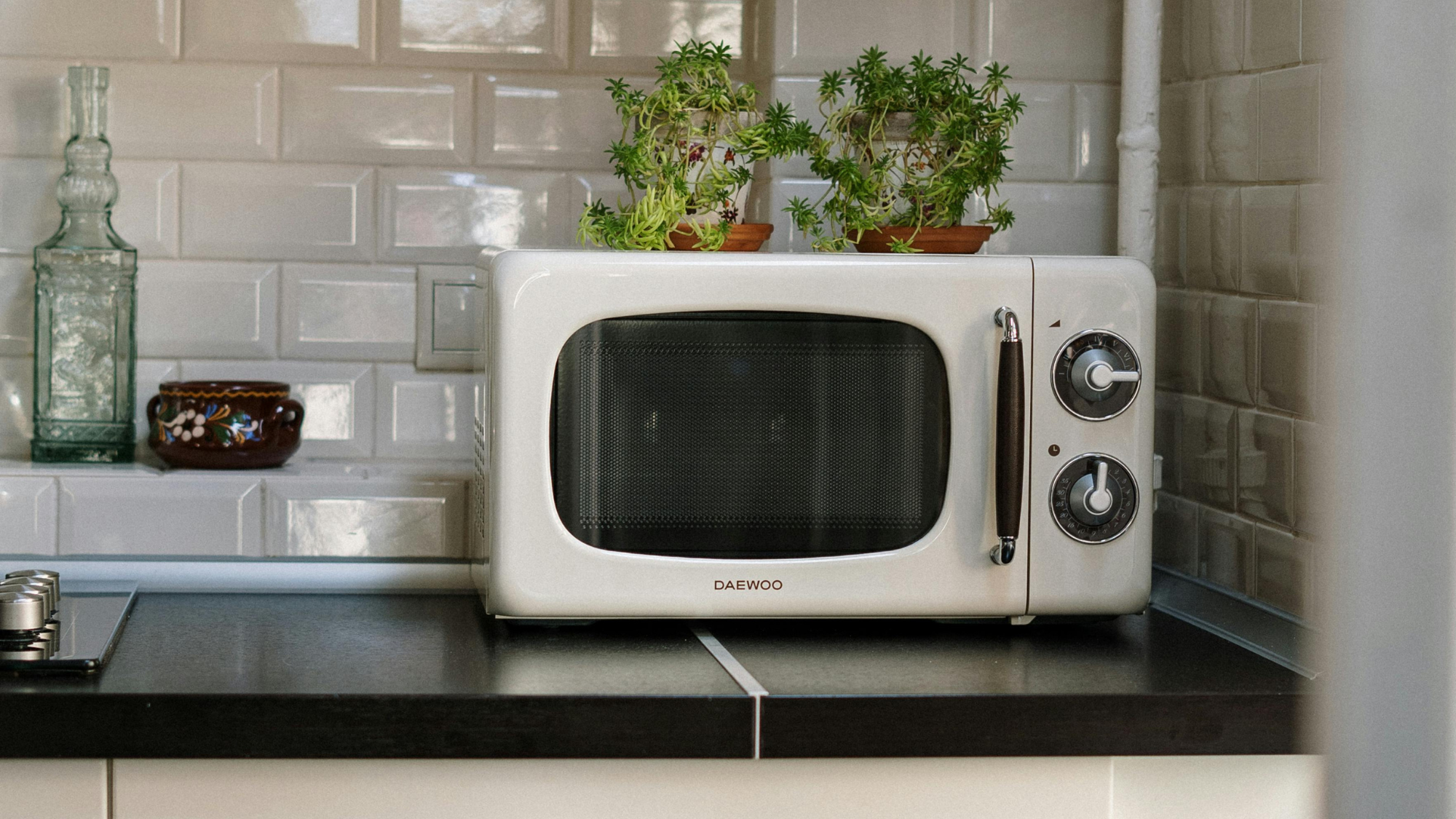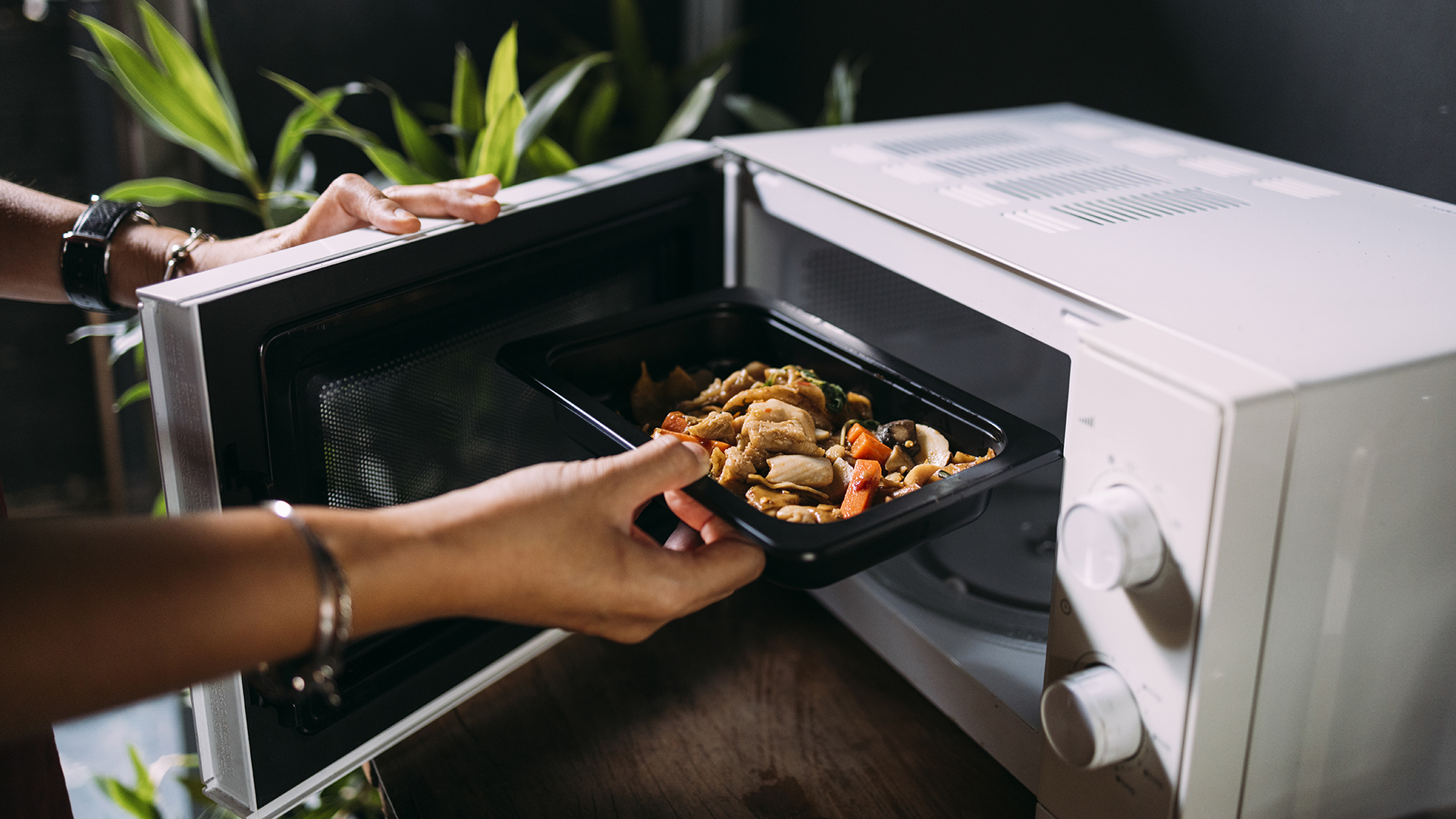How long should a microwave last? And how to make it live longer, according to experts
Make yours last as long as possible

How long should a microwave last? Whether you’re in the market for one of the best microwaves, need expert advice on how to make yours last longer, or want to know when it’s time to replace it, I’ve got you covered.
Microwave ovens are undoubtedly convenient and energy-saving, but how do you know when to buy a new one? And is it worth fixing a microwave?
I consulted several experts to determine a microwave's lifespan, how to prolong its life, and when to consider replacing it.
How long should a microwave last?
Modern microwaves are designed to last at least eight years, but if used by a big family with little or no maintenance, their lifespan is more likely to be around half a decade.
The type of microwave you own could also impact its longevity. Over-the-range microwaves are built into the cabinetry and bolted to a wall, so if they break and need replacing, it's no easy task.

Dr. Bryan Quoc Le is a food scientist, food industry consultant and author of the book 150 Food Science Questions Answered. He consults for companies and startups in the food and beverage industry with clients including Blue Diamond Growers, Little Caesars Pizza and Black Sheep Foods.
Countertop ones are easier to repair, while combi convection microwave ovens have to work harder because they are multipurpose, so they are prone to breaking sooner.
Food scientist Dr. Bryan Quoc Le says: "Microwaves can have a lifespan of anywhere from eight to 15 years, largely depending on where the appliance was manufactured."
Sign up to receive the latest news, reviews, buying guides and deals direct to your inbox
Do more expensive microwaves last longer?
Knowing how much a microwave costs will help with this, but deciding what makes for a "good" microwave and what is considered "expensive" isn't always clear.
Tech expert Jason Farrell, from Mechanic's Diary, told Top Ten Reviews: "More expensive microwaves are often built with higher-quality materials and components, which can contribute to a longer lifespan. They also tend to come with longer warranties, which shows that the manufacturer stands behind the product.
"But, remember that price isn't everything—reviews and brand reputation are also important factors to consider."
Dr. Quoc Le adds: "More expensive microwaves can still be subject to planned obsolescence - where the company dictates the appliance's lifespan, and the product has a set timeframe in which it can last before a new one has to be purchased."

Jason Farrell is a technical specialist who knows his way around a microwave. He is also a certified master technician at Mechanic's Diary with nearly 18 years experience.
Looking at microwaves on Amazon, I've found that you can expect to pay $115 to $318 for a Toshiba microwave, while a built-in oven/microwave combo from aesthetics-led Café would set you back $2,899. It looks like the most expensive countertop microwave listed on the site is the Panasonic NE-1054 which has an RRP of $1,300, while the cheapest is the 700-watt Farberware model at $85.
When should you replace a microwave?
There are some obvious signs your microwave needs replacing, warns Dr. Deborah Lee from Dr Fox Online Pharmacy.
- You can’t get rid of a burning smell when it’s cooking
- The food seems to be constantly undercooked
- The door doesn’t shut properly
- The keypad doesn’t work
- The wiring looks suspect
- It is very noisy when turned on
- There are obvious staining, rust, or peeling edges
In some cases, a small repair is more cost-effective than replacing your appliance. If your food isn't properly heated, replacing your microwave would be worth considering. The same goes for if you hear a buzzing, rattling noise or can smell burning—this can be a sign that there's an obstruction in the fan blades or turntable. You should immediately turn off, unplug the microwave, and call for repair.
If the keypad isn't working properly, it could affect cooking time, but this usually just means it needs a good cleaning. However, issues with the door seal can impact the radiation level, and investing in a new one is the best option.
If your microwave has reached the 10-year mark and needs frequent repairs, it is wise to replace it with a more energy-efficient model.

Having worked for many years in the UK for the NHS (National Health Service) as a lead clinician, Dr. Deborah Lee now works as a health and medical writer for Dr Fox Online Pharmacy.
Is it worth fixing a microwave?
If the repair costs are more than 50 percent of a new microwave's, or your appliance is over four to five years old (over half its lifespan), it's generally better to replace it.
But Dr. Quoc Le says he wouldn't bother fixing a broken microwave. "Microwaves are relatively inexpensive compared with other appliances and can require extensive technical knowledge to repair. Microwaves should only be repaired when they are under warranty."
How to make a microwave last longer?
- Regularly cleaning
- Use the correct detergent
- Avoid overloading
- Run a cleaning cycle periodically
Farrell says: "Avoid using harsh chemicals when cleaning and follow the manufacturer's weight and size limits guidelines to prevent overloading. Also, avoid putting metal objects, aluminum foil, or certain plastics inside, as these can cause damage or even start a fire."
Microwaves are not hugely expensive, so unless they can be easily repaired, it's probably more cost-effective to buy a new one.
"Microwaves typically start to decline after ten years, so it's a good time to consider a new one," says Dr. Quoc Le.
Do microwaves lose effectiveness over time?
Yes, they do, and the best way to identify this is by noting the cooking time.
Your microwave will either cook faster or slower than expected, which indicates that the internal components have worn out. With heavy or prolonged usage and no proper maintenance, a microwave can wear out long before reaching its average life span.
Buying Guides
Best microwaves: speedy, convenient, and energy-efficient appliances, tried and tested
Reviews
LG MSER0990S 0.9 Cu. Ft. Countertop Microwave review: a large appliance with plenty of cooking room
Cuisinart CMW-70 0.7 Cu. Ft. Microwave review: a solid microwave with multiple customization options
LG LMC2075ST 2.0 cu. ft. NeoChef Countertop Microwave review
Breville BMO870BSS1BUC1 Combi Wave Microwave review: a versatile oven for clutter-free kitchens
"Plus, the electronic components can start to wear down and increase electrical resistance," says Dr. Quoc Le.
"The microwave magnetron, which produces the electromagnetic waves that heat the food, can lose efficiency and generate less power, rendering the microwave less effective at heating food.
"Burned spots, charred food, and debris in the inner container can preferentially absorb microwaves instead of the food, heating other sections of the microwave rather than the dish."

Verdict
If you want to know how long a microwave should last when choosing a microwave or just feel curious, it’ll depend on usage and the type of oven you own. Newer machines are more energy-efficient, and countertop microwaves tend to last longer than combi convection ones as they have to work harder, making them more likely to die sooner.
Certain brands, like high-end ones Wolf and Viking, tend to last longer, roughly ten to 15 years, while the average shelf life is seven to eight. Keeping your appliance well-maintained and cleaning it regularly can extend its lifespan.
Farrell says: "Modern microwaves are generally more energy-efficient than older models. If you’ve had your microwave for a while, you might consider upgrading to save on energy costs. Also, if your microwave is malfunctioning or damaged, unplug it until you can get it repaired or replaced."
Maddy has been a writer and editor for 25 years, and has worked for some of the UK's bestselling newspapers and women’s magazines, including Marie Claire, The Sunday Times and Women's Health. Maddy is also a fully qualified Level 3 Personal Trainer, specializing in helping busy women over 40 navigate menopause.

